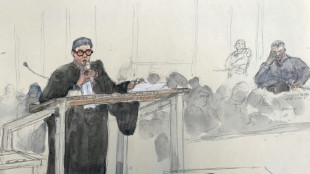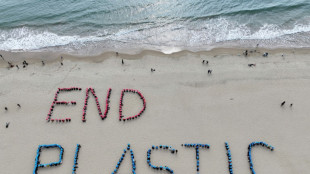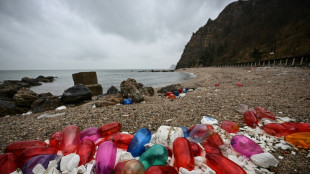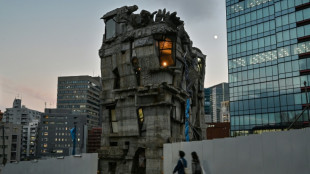
-
 Coffee price heats up on tight Brazil crop fears
Coffee price heats up on tight Brazil crop fears
-
Maeda salvages Celtic draw against Club Brugge

-
 Villa denied late winner against Juventus
Villa denied late winner against Juventus
-
Dortmund beat Zagreb to climb into Champions League top four

-
 Mbappe misses penalty as Liverpool exact revenge on Real Madrid
Mbappe misses penalty as Liverpool exact revenge on Real Madrid
-
Brazil's top court takes on regulation of social media

-
 Thousands still queuing to vote after Namibia polls close
Thousands still queuing to vote after Namibia polls close
-
Trump taps retired general for key Ukraine conflict role

-
 Canadian fund drops bid for Spanish pharma firm Grifols
Canadian fund drops bid for Spanish pharma firm Grifols
-
Argentine ex-president Fernandez gives statement in corruption case

-
 Mexico says Trump tariffs would cost 400,000 US jobs
Mexico says Trump tariffs would cost 400,000 US jobs
-
Car-centric Saudi to open first part of Riyadh Metro

-
 Brussels, not Paris, will decide EU-Mercosur trade deal: Lula
Brussels, not Paris, will decide EU-Mercosur trade deal: Lula
-
Faeces, vomit offer clues to how dinosaurs rose to rule Earth

-
 Ruby slippers from 'The Wizard of Oz' up for auction
Ruby slippers from 'The Wizard of Oz' up for auction
-
Spain factory explosion kills three, injures seven

-
 US Fed's favored inflation gauge ticks up in October
US Fed's favored inflation gauge ticks up in October
-
Defence lawyers plead to judges in French mass rape trial

-
 US says China releases three 'wrongfully detained' Americans
US says China releases three 'wrongfully detained' Americans
-
New clashes in Mozambique as two reported killed

-
 Romania officials to meet over 'cyber risks' to elections
Romania officials to meet over 'cyber risks' to elections
-
Chelsea visit next stop in Heidenheim's 'unthinkable' rise

-
 Former England prop Marler announces retirement from rugby
Former England prop Marler announces retirement from rugby
-
Kumara gives Sri Lanka edge on rain-hit day against South Africa

-
 Namibia votes with ruling party facing toughest race yet
Namibia votes with ruling party facing toughest race yet
-
Spurs goalkeeper Vicario out for 'months' with broken ankle

-
 Moscow expels German journalists, Berlin denies closing Russia TV bureau
Moscow expels German journalists, Berlin denies closing Russia TV bureau
-
Spain govt defends flood response and offers new aid

-
 France says Netanyahu has 'immunity' from ICC warrants
France says Netanyahu has 'immunity' from ICC warrants
-
Nigerian state visit signals shift in France's Africa strategy

-
 Stock markets waver as traders weigh Trump tariffs, inflation
Stock markets waver as traders weigh Trump tariffs, inflation
-
Tens of thousands in Lebanon head home as Israel-Hezbollah truce takes hold

-
 Opposition candidates killed in Tanzania local election
Opposition candidates killed in Tanzania local election
-
Amorim eyes victory in first Man Utd home game to kickstart new era

-
 Fresh fury as Mozambique police mow down protester
Fresh fury as Mozambique police mow down protester
-
Defeat at Liverpool could end Man City title hopes, says Gundogan

-
 Indonesians vote in regional election seen as test for Prabowo
Indonesians vote in regional election seen as test for Prabowo
-
Guardiola says no intent to 'make light' of self harm in post-match comments

-
 New EU commission gets green light to launch defence, economy push
New EU commission gets green light to launch defence, economy push
-
Opposition figures killed as Tanzania holds local election

-
 Taiwan Olympic boxing champion quits event after gender questions
Taiwan Olympic boxing champion quits event after gender questions
-
European stocks drop on Trump trade war worries

-
 Volkswagen to sell operations in China's Xinjiang
Volkswagen to sell operations in China's Xinjiang
-
FA probes referee David Coote over betting claim

-
 Serbia gripped by TV series about murder of prime minister
Serbia gripped by TV series about murder of prime minister
-
Putin seeks to shore up ties on visit to 'friendly' Kazakhstan

-
 New EU commission pushes for defence and economy spending
New EU commission pushes for defence and economy spending
-
Plastic pollution talks must speed up, chair warns

-
 Pakistan web controls quash dissent and potential
Pakistan web controls quash dissent and potential
-
1,000 Pakistan protesters arrested in pro-Khan capital march


Indigenous writer Ailton Krenak, postponing the end of the world
The year was 1987, Brazil was just exiting a long military dictatorship, and Indigenous writer Ailton Krenak stood before the country's constitutional assembly in a pristine white suit, smearing black paint across his face.
"Indigenous peoples have watered every scrap of Brazil's eight million square kilometers with their blood," the handsome young activist defiantly told the assembly, using a traditional mourning ritual to protest centuries of violence against native peoples.
Thirty-six years after that memorable protest, which helped ensure the nation's new constitution protected native land rights, Krenak achieved what he calls a new "historic reparation" last month, when he was chosen as the first Indigenous member of the Brazilian Academy of Letters.
Founded in 1897, the Academy is the rough equivalent of France's hallowed Academie Francaise or Spain's Real Academia.
Seen as a standard-bearer of Brazilian language and literature, the Rio de Janeiro institution is made up of 40 members known as the "immortals," who hold their seats for life.
Known for its hushed halls and hallowed rituals -- its members convene for formal gatherings in gold-embroidered uniforms -- it is perhaps an unusual spot for life-long rabble-rouser Krenak, 70.
"We're going to bring a little noise to that century-old silence," the philosopher, writer and poet told AFP in an interview in Sao Paulo.
The Academy "has always been closed to native peoples and dominated by (Brazilian) Portuguese."
Krenak says he hopes to use his seat in the institution to help shine a spotlight on Brazil's nearly 200 Indigenous languages.
"Through language, literature and the arts, Indigenous cultures can be perceived as living things, not just something from the past," he says, speaking in calm but razor-sharp sentences.
Despite the horrors of the colonial past, "we are alive," he adds. "We won."
- In the flesh -
A member of the Krenak people of southeastern Brazil, whose surname he bears, the writer has lived the Indigenous struggle in the flesh.
His people were expelled from their land around 1970, during the dictatorship (1964-1985), forcing him and his family into exile.
At 18, he left for the southern state of Parana to study "the colonizer's language," earning a journalism degree. It is the language in which he writes his books.
After enduring torture and persecution by the military regime, the Krenak only partly recovered their lands with the return to democracy. Their 600 remaining members were scattered across several states.
Krenak's own fight is rooted in their suffering.
Considered one of Brazil's leading Indigenous intellectuals, he has written a highly regarded body of work criticizing colonialism and capitalism, including the critically acclaimed essay "Ideas to Postpone the End of the World" (2019), translated into more than 10 languages.
The Indigenous leader, who is discreet on his personal life, married fellow activist Irani Krenak in 2000. They had three children, one of whom died in an accident. Another daughter from a previous relationship also died.
- Different vision -
Krenak rejects the notion that European colonizers brought "civilization" to the Americas.
In fact, they brought a way of life that divorced humankind from nature, leading to a world where corporations "devour forests, mountains and rivers," he writes.
Krenak proposes a different way of life, akin to that of the native communities who resisted colonialism, fiercely clinging to their land.
About four years ago, he moved to his people's land on the banks of the Rio Doce river, home to around 350 Indigenous people.
But even there, what he calls the "corporate monster" is inescapable. A case in point: a notorious mine dam collapse in 2015 that caused an environmental disaster on the river, a vital source of water and food for his people.
The accelerating destruction of nature affects everyone, Krenak says.
"It's not just Indigenous peoples who are threatened by the damage anymore. Now white people are, too," he says, wearing a striped shirt and traditional feather necklace.
For now, he says, he is "biding (his) time" hoping for political and social change.
But in the end, he says, he expects the Earth to move beyond humankind.
"My hope is that we'll be discarded as quickly as possible so the planet can continue its magnificent journey."
O.Bulka--BTB



